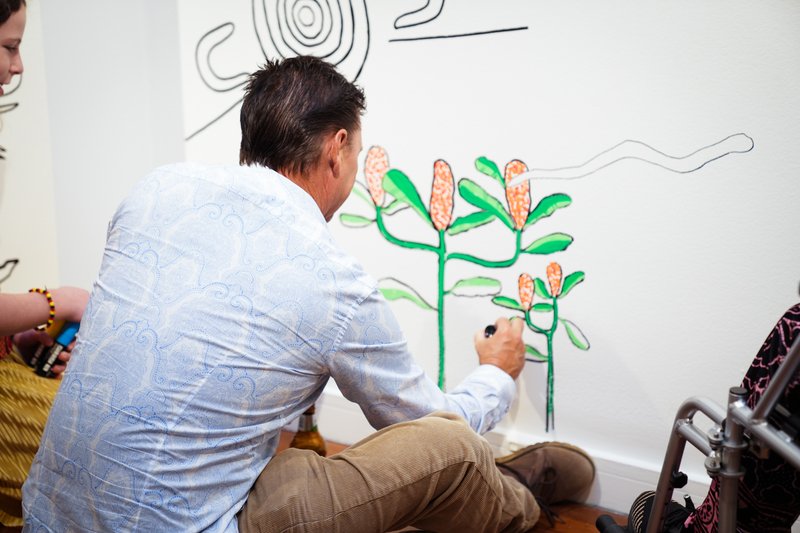Reconciliation Action Plan Progress Report Jan-Apr 2023
An update on NAVA’s progress against our eight RAP commitments for January, February, March and April 2023.
An update on NAVA’s progress against our eight RAP commitments for January, February, March and April 2023.

Songlines & Sightlines, 2022, photographed by Raf Flores, featuring works by Leanne Mulgo Redpath, Erin Wilkins, and Peter Rush, curated by Tian Zhang and A’isyiyah Prahastono. Courtesy of Blacktown Arts and Blacktown City Council.
ID: Photo of the back of a person sitting on the ground and holding a marker against a collaborative mural on a white wall. The mural depicts illustrations of banksia in black, green and yellow marker and Aboriginal symbols and elements including circles, lines and curved shapes in black marker.
NAVA’s Reconciliation Action Plan (RAP), launched in March 2023, outlined our commitments for January 2023 - January 2024. NAVA’s reconciliation vision is for a vital, sustainable and ethical contemporary arts sector where First Nations arts and culture is at the core. Our vision for reconciliation centres principles of First Nations self-determination and story sovereignty, supported by broad and thriving networks of Aboriginal and Torres Strait Islander artists, arts workers and leaders.
This vision will be achieved by working collaboratively with First Nations colleagues to support First Nations culture bearers, artists, organisations, communities, and knowledges across Australia in all of our advocacy, learning and Membership services.
The below report highlights NAVA’s progress against our eight RAP commitments for January, February, March and April 2023.
1. Establish and strengthen mutually beneficial relationships with Aboriginal and Torres Strait Islander stakeholders and organisations.
Progress: Completed
Outcomes: NAVA developed and circulated among staff a two-page document on Aboriginal and Torres Strait Islander stakeholders and organisations, and a five-page research document on best practice and principles supporting these partnerships. The NAVA team continues to discuss how to apply and embed the learnings into our ongoing work and future collaborations.
2. Promote reconciliation through our sphere of influence.
Progress: Completed
Outcomes: NAVA’s commitment to reconciliation has been communicated to all staff via email, team meetings, and briefing sessions. All NAVA staff have contributed to developing the RAP. A two-page document identifying external stakeholders and RAP organisations has been developed and circulated to all staff. At this stage, one organisation has been approached and a meeting has been scheduled with another organisation in June.
3. Promote equitable race relations through anti-discrimination and anti-racism strategies.
Progress: Completed
Outcomes: A six-page research document has been created and circulated to all staff.
4. Increase understanding, value and recognition of Aboriginal and Torres Strait Islander cultures, histories, knowledge and rights through cultural learning.
Progress: Completed
Outcomes: A one-page review has been developed and circulated to all staff. Quotes are being sought and financials are being assessed to support a learning path for staff to build their cultural competence.
5. Demonstrate respect to Aboriginal and Torres Strait Islander peoples by observing cultural protocols.
Progress: Completed > Ongoing maintenance
Outcomes: Four staff members have enrolled in Acknowledging Country Meaningfully by Yarn Bark, which is an ongoing self-paced course. A working document on developing an understanding of local Traditional Owners has been initiated, and four staff members have contributed. A budget has been allocated for all staff members to attend local First Nations events. NAVA Board and staff have been encouraged to learn how to say ‘Hello’ in the language(s) local to the Country they live and work on.
6. Improve employment outcomes by increasing Aboriginal and Torres Strait Islander recruitment, retention and professional development.
Progress: In progress
Outcomes: NAVA Executive Director and Chair of the Board met with a legal firm to seek assistance in developing and implementing a First Nations Policy to embed First Nations focused directives within the NAVA structure and strategic framework. The aim is to lift the organisation’s cultural competency and support a culturally safe workplace for First Nations employment within NAVA.
7. Establish and maintain an effective RAP Working Group (RWG) to drive governance of the RAP.
Progress: Ongoing maintenance
Outcomes: The RWG consists of two staff members who meet weekly to discuss deliverables and updates for the team. The RWG has created a two-page Terms of Reference that states the RWG will be open in the future to other staff members, NAVA Board directors, and external Aboriginal and Torres Strait Islander representatives. This has yet to be implemented. The RWG team meeting minutes are available for all staff to view.
8. Provide appropriate support for effective implementation of RAP commitments.
Progress: Completed
Outcomes: The RWG and the Finance and Operations Coordinator have allocated a budget of $500 to reimburse staff who participate in events for National Reconciliation Week and NAIDOC Week, as well as other experiences that support an understanding of local Traditional Owners. An hourly rate of $133.20 (including superannuation) has been identified to remunerate external First Nations stakeholders who take part in the RAP Working Group.
National Association for the Visual Arts (NAVA) acknowledges the Gadigal, Wangal, Dharug, Dharawal, Kaurna, Ngunnawal, Ngambri and Dja Dja Wurrung peoples as the Traditional Custodians and Knowledge Holders of the unceded lands on which we live, learn and work.
The NAVA community is based across hundreds of sovereign Nations and unceded lands throughout the continent that has become colonially known as Australia. NAVA pays our deepest respects to all Custodians of Country to whom these lands belong.
We acknowledge Aboriginal and Torres Strait Islander peoples as the first artists and storytellers on this continent, and pay respect to First Nations communities’ Ancestors and Elders.
Sovereignty was never ceded. Always was, always will be Aboriginal land.